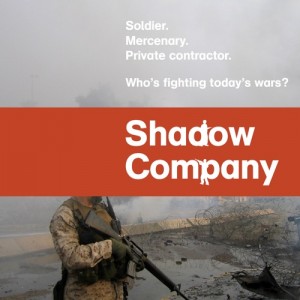The Shadow Company: Movie Review
The documentary “Shadow company” examines the sphere of private security companies around the world and sheds light on the much needed distinction between soldier and mercenary.
Prior to watching the “Shadow company,” I had little to no knowledge about the world of private security companies. In addition, I falsely viewed the term mercenary as a synonym of soldier. Sooner than later, the documentary corrected my view of the term.The “Shadow company” indicates that a soldier is one who engages in military service for a specific country within the rules of warfare whereas a mercenary is hired to serve in a foreign army. Where the use of force by soldiers is justified, the use of force by mercenaries lacks justification due to the mere fact that they are paid to fight and are increasingly money oriented.
After watching the documentary, I held the view that the use of private military contractors in foreign countries is unethical. Firstly, the interviewees and the speaker Alan Bell seemed to be “trying too hard” to alter the views of the public about the negative connotation associated with mercenaries. The interviewees repeatedly attempted to justify and normalize the occupation of mercenaries. I was not surprised that most of their statements revolved around portraying PMC’s in a positive light as they clearly were/are personally involved in these companies. In addition, their recognition of the negative connotations surrounding mercenaries and their admittance that mercenaries avoid/substitute the use of the term ‘mercenary’ due to its reputation, further undermined their positive statements on PMC’s.
Another concern that I have in regards to PMC’s “ethicability” relies on the treatment of the employees and the dangers they encounter in specific missions. For example, as illustrated in the documentary, in Equatorial New Guinea the employees were immediately arrested when the mission failed while the CEOs that planned the mission carried on with their work and suffered no consequences. Although I understand that employees are aware of the dangers they get themselves into, I think they should still get some support from the company, especially when a mission fails and they are thrown in jail, tortured or killed because of it.
In terms of accepting and refusing contracts, many interviewees including the speaker Alan Bell claimed that they turn down contracts that appear to be immoral or unlawful. However, the fact that unlawful contracts are being sent to these companies and the fact that they can be turned down by one company and later accepted by another (depending on one’s personal view of whether an entity is criminal or not) is frightening. The mere fact that PMC’s are a part of an industry where some companies do take on unethical contracts and are often concerned with making money at the expense of ethics, justifiably earns them their negative reputation.
In context, I believe that private security companies at large are unethical.The interviewees in the “Shadow Company” and Alan Bell did not convince me otherwise. However, in the larger scheme of things I will keep an open mind and I will claim that this does not apply to all PMCs but it applies to the majority of PMCs. I am aware that companies differ in goals and intentions and so I believe that there might be one or two companies out there with good and ethical intentions (I hope).
In conclusion, I will hold on to the belief that PMC’s at large and specifically in the context of “The Shadow Company” and Alan Bell’s Globe Risk company appear to be unethical. Therefore, they are deserving of the negative connotations surrounding them.

